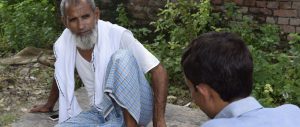Sustaining Gains through India’s Agriculture Technology Application Research Institutes

Delhi, India (CSISA) – In the past year, the Cereal Systems Initiative for South Asia (CSISA), has trained scientists from 15 Krishi Vigyan Kendras (KVKs) – agricultural extension centers – in Bihar and eastern Uttar Pradesh on improved methods of survey design and on the digital data collection tool, Open Data Kit (ODK).
CSISA and its partner KVKs, have identified the strengthening of the monitoring, learning and evaluation (ML&E) systems as a strategic objective of the collaboration. With improved data collection and analysis, the KVKs can assess farmers’ agronomic practices and cropping system productivity to see how their practices compare with state-level agricultural recommendations and to undertake a critical review of official recommendations and update them if necessary.
Designing surveys as digital questionnaires allows surveys to be shorter, more streamlined and faster to implement. Digital data collection allows researchers and ML&E staff to generate datasets in real time, reducing the time it takes to collect data and minimizing the opportunities for error that occur when transferring data from paper forms to electronic spreadsheets. ODK is an open-source platform that is easy for KVKS to adopt, streamline and facilitate data collection, storage, analysis and sharing.
From the first batch of 15-trained KVKs, seven have already deployed improved survey design methods and implemented a survey through ODK. Seven KVKs in Bihar are conducting a coordinated survey on wheat production practices for the 2016-17 cropping season. The survey covers 129 villages and 1,855 farming households. From the findings, it was quickly observable that farmers are using slightly more nitrogen- and phosphate-based fertilizers than recommended by the state agriculture universities and official dose recommendations. Using higher-than-recommended fertilizer doses does not increase yields, only cost.
CSISA has worked with KVKs since 2015 to test and modify locally-relevant technologies and help integrate successful technologies into the government’s official package of practices for each state.
CSISA is facilitating KVK scientists to survey farmers’ practices and conduct agronomic trials on nutrient productivity so that they can feed locally relevant research results into extension systems. In the areas where KVKs operate, improved ML&E systems, as well as better, cleaner and more readily available data, can help these KVKs align their activities with the seasonal priorities and investments of the state-level departments of agriculture, as well as help inform the research priorities of the state agriculture universities.
The Cereal Systems Initiative for South Asia is led by the International Maize and Wheat Improvement Center and implemented jointly with the International Food Policy Research Institute and the International Rice Research Institute.
This article was authored by Anurag Ajay.
Photo credit: Anurag Ajay/CIMMYT